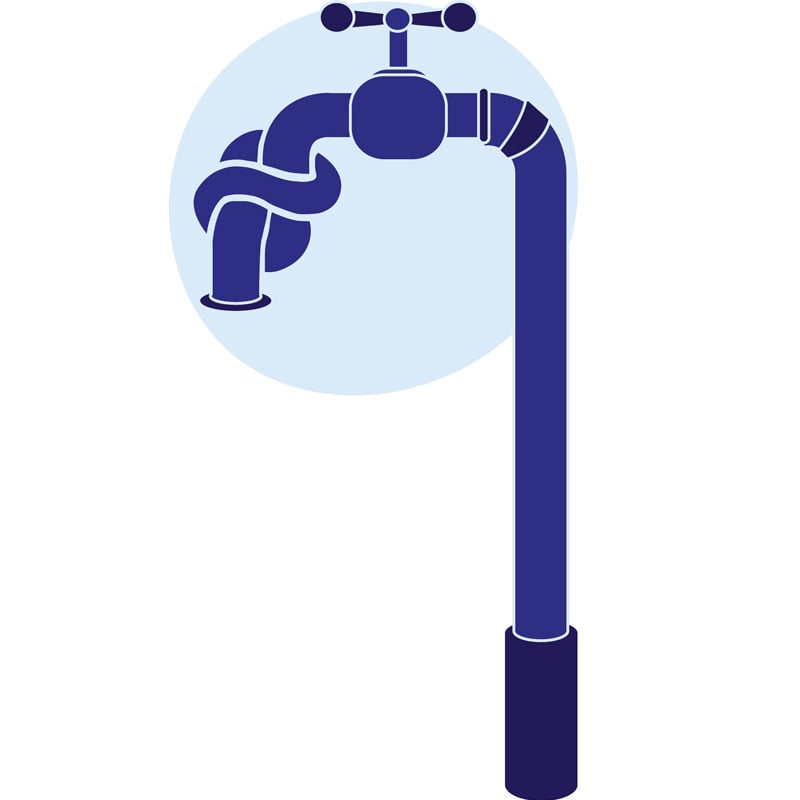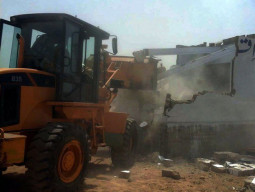
As temperature begins to sear and taps run dry in the first week of the holy month, it appears Karachi residents will be tested by a lot more than the scorching sun this Ramazan. Owing to various mismanagements by Karachi Water and Sewage Board (KWSB), the city of 20 million is feared to be on the brink of yet another water crisis, which is likely to augment the troubles of the fasting population.
Per reports, KWSB had previously formulated a rotation policy for the provision of water in the city. The policy mandated the water board to ensure water supply for 2-4 days in a week, in all areas of the city. But while the policy is implemented to some extent in winter months, the entire system is seen to routinely collapse with the rise in mercury.
A survey conducted by The Express Tribune in the regard, reveals that the water board, instead on addressing these issues in a timely manner, has once again closed its eyes to the crisis, possibly expecting the impending summer water shortage to magically disappear on its own.
To add insult to injury, the resulting obstruction in water supply in most areas, has led to a significant jump in government and commercial water tanker rates, while the city’s already rampant tanker mafia has been left to further exploit the situation.
However, public allegations in the regard hold KWSB, a government entity, responsible for creating an artificial water crisis, offering the reasoning that if water can be supplied through tankers and hydrants, there shouldn’t be any impediments stopping it from flowing through water board lines.
Meanwhile, KWSB engineers speaking on conditions of anonymity, shared that Karachi’s water shortage is owed to the amount of water being supplied to the city, and is compounded by the dilapidated water system. “The city needs at least 12 million gallons of water per day (MGD), but we are only supplied with a total of 570MGD, out of which some 160MGD is lost to broken pipelines and other impediments in the time-worn water lines. Thus we are forced to rely on water tankers for supply, where the pipelines are too dilapidated to function,” the engineer told.
Currently, New Karachi, North Karachi, Baldia Town, Orangi Town, Landhi, Malir, Korangi, Gulshan-e-Iqbal 13 D-1, 2,3, block 1, block 5, Gulistan-e-Jauhar, Kharadar, Saddar, Kaemari, Shah Faisal Colony, Mehmoodabad, North Nazimabad, Nazimabad, Liaquatabad, Gulberg Lines Area and PECHS, are among areas experiencing the worse of Karachi’s water crisis.
Residents of these varied localities, who have been forced to buy expensive tanker water or rely on hazardous ground water sources, complain of an augmented struggle in the month of Ramazan. “KWSB has also failed to hydrate Karachi’s various mosques, imambargahs, and taraweeh-centres, all of which are expected to welcome throngs of worshippers during the Muslim holy month. This reflects the department’s lack of foresight and effective planning, in advance of the Ramazan,” various citizens unanimously claimed.
According to Jamia Masjid Faizan-e-Auliya Khateeb Syed Muhammad Ali Shah, North Karachi Sector 11/H and neighboring areas have been toiling with an extreme water shortage. “Sometimes water’s only supplied once or twice in 15 days, and even then heavy water pumps installed in high-rise residential buildings suck the entire flow, leaving very little to the mosque’s share. The leakages in KWSB pipelines also means that sewage waste routinely seeps into our water lines, making entire tanks impure. So we have no option but to depend on tankers, which can cost between Rs2,200 to Rs3,800 depending on size,” the khateeb lamented.
Addressing the issue, a KWSB spokesperson said that his department, on directives of local body ministers and managing director water board, has already commenced repair and cleaning work on affected pipelines. In addition to which, all KWSB engineers have also been directed to ensure fair distribution of water. “As for the surge in water tanker prices- it is owed to the increase in electricity and diesel rates, but we are still trying to supply free water tankers to all deputy commissioners as ordered by the chief minister. It is the deputy commissioners’ job to make sure the tankers reach the poorest localities,” he told The Express Tribune.
Published in The Express Tribune, April 19th, 2021.




1732263441-0/BeFunky-collage-(81)1732263441-0-165x106.webp)
1732263755-0/musk-(3)1732263755-0-165x106.webp)












COMMENTS
Comments are moderated and generally will be posted if they are on-topic and not abusive.
For more information, please see our Comments FAQ